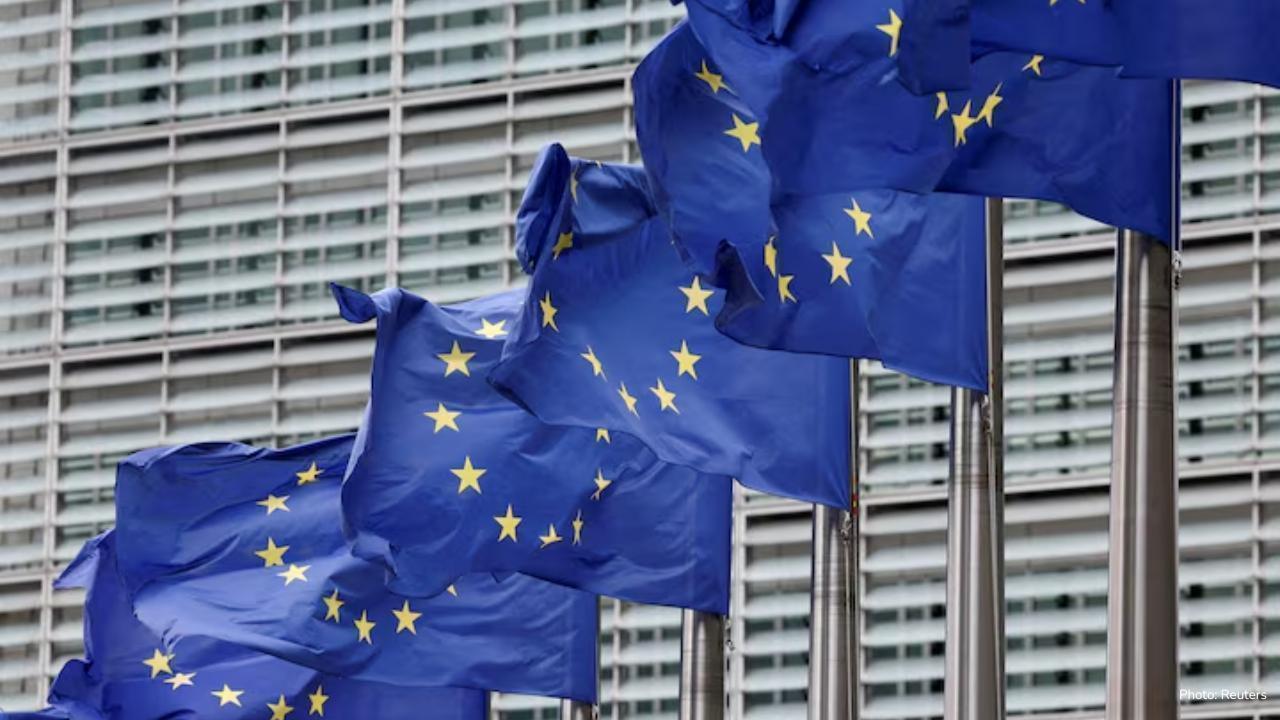
Post by : Monika
In a major effort to strengthen Europe’s role in the global semiconductor industry, all 27 European Union (EU) member states have joined a Dutch-led initiative called the “Semicon Coalition.”
The coalition is pushing for a revised version of the EU’s Chips Act, known as Chips Act 2.0, which aims to boost Europe’s technological capabilities, improve funding, and ensure that the region can compete effectively in the rapidly evolving semiconductor market.
Background on Europe’s Semiconductor Goals
The EU has long sought to increase its share of global semiconductor production. Semiconductors, also known as chips, are essential components in electronics, computers, smartphones, cars, and many other devices. They are also crucial for defense, artificial intelligence, and digital technologies.
The original Chips Act, introduced by the EU, aimed to achieve a 20% share of the global semiconductor market by 2030. While the act attracted significant investment, it faced challenges in bringing advanced chip production to Europe. Some major companies, like Intel, canceled plans for factories in Germany, highlighting gaps in the current strategy.
The EU’s goal is not just economic growth. Semiconductors are strategically important. They determine technological leadership, national security, and digital independence. With countries like the United States and China investing heavily in semiconductor production, Europe must act to remain competitive.
Formation of the Semicon Coalition
The Semicon Coalition was initiated in March 2025 by the Netherlands along with eight other EU member states. Its goal is to unite EU countries around a stronger, clearer semiconductor strategy.
On September 29, 2025, the coalition submitted a formal declaration to the European Commission, urging policymakers to revise the Chips Act. The declaration calls for a shift in focus from simply achieving a 20% market share to securing critical technologies, simplifying approvals for new factories, and expanding funding and skills in the semiconductor sector.
The coalition now includes all 27 EU member states, making it a united voice in support of Chips Act 2.0. This broad support shows the EU’s recognition that semiconductors are not just an industry, but a strategic necessity for the entire region.
Challenges with the Original Chips Act
While the original EU Chips Act was praised for spurring investment, it has faced several challenges:
Attracting advanced chip production – The cancellation of Intel’s planned factory in Germany revealed that Europe must create a more appealing environment for high-tech semiconductor manufacturing.
High costs – Semiconductor factories are expensive to build and operate. Europe competes with countries like the United States, South Korea, and Taiwan, which offer strong incentives to attract chip makers.
Complex regulations – Companies reported that bureaucratic hurdles slowed down approvals for new plants, making it harder to quickly increase production.
Skills gap – Europe faces a shortage of highly skilled engineers and technicians needed for advanced semiconductor production. Training and education programs must expand to meet the demand.
The Semicon Coalition aims to address these challenges by proposing faster approvals, dedicated budgets, and programs to train more semiconductor experts.
Industry Support for Chips Act 2.0
The Semicon Coalition declaration received strong backing from the industry. Over 50 semiconductor companies, including Nvidia, ASML, Intel, STMicroelectronics, and Infineon, signed the declaration in support of the revised strategy.
Industry leaders emphasized the need for increased funding, a separate EU budget for semiconductor initiatives, and better coordination between member states. These companies stressed that Europe could only compete globally if the policy framework supports large-scale, high-tech chip production.
According to industry experts, the EU’s semiconductor market share is projected to grow from 9.8% in 2022 to 11.7% by 2030, still below the original target of 20%. Without significant policy changes, Europe risks falling behind in the global semiconductor race.
Key Objectives of Chips Act 2.0
The revised Chips Act 2.0 aims to address Europe’s semiconductor challenges with several important objectives:
Critical Technology Focus: Instead of only measuring market share, the act emphasizes securing technologies crucial for the future, including advanced logic chips, memory chips, and AI chips.
Streamlined Approvals: Simplifying regulatory processes to make it easier and faster to build new semiconductor factories in Europe.
Funding Expansion: Increasing EU investment to support research, innovation, and manufacturing. This includes both private and public funding initiatives.
Skills Development: Expanding training programs to increase the number of engineers and technicians skilled in semiconductor production.
Supply Chain Resilience: Strengthening Europe’s supply chain to avoid dependency on external countries for critical chip components.
Collaboration Across Member States: Encouraging EU countries to work together on research, manufacturing, and policy decisions to create a unified semiconductor ecosystem.
Importance of Semiconductors for Europe
Semiconductors are not just important for consumer electronics; they are essential for strategic industries:
Automotive: Electric cars, smart vehicles, and autonomous driving systems require advanced chips.
Defense: Military technology and cybersecurity rely on secure and advanced semiconductors.
AI and Robotics: Artificial intelligence applications need high-performance chips to function efficiently.
Healthcare: Medical devices, imaging systems, and lab equipment rely on semiconductor technology.
Without strong semiconductor production, Europe risks dependency on other countries, which could affect economic growth, national security, and technological leadership.
Geopolitical Considerations
The semiconductor industry is highly geopolitical. Countries like the United States, China, South Korea, and Taiwan dominate chip production. The EU aims to reduce reliance on these nations to protect technological sovereignty.
Geopolitical tensions, trade wars, and export restrictions have highlighted the importance of domestic chip production. By strengthening its semiconductor industry, Europe can ensure stability, security, and independence in key technological areas.
Role of the Dutch Leadership
The Netherlands has taken a leading role in the Semicon Coalition, reflecting its expertise in the industry. The country is home to ASML, one of the world’s leading semiconductor equipment makers.
Dutch officials argue that cooperation among EU member states is essential for success. No single country can achieve a competitive edge alone; a unified approach will strengthen Europe’s global position.
Future Prospects
The formation of the Semicon Coalition and the push for Chips Act 2.0 represent a united effort by the European Union to strengthen its semiconductor industry. By focusing on critical technologies, streamlining approvals, increasing funding, and developing a skilled workforce, the EU aims to compete effectively on a global scale.
This initiative is crucial for Europe’s technological sovereignty, economic growth, and national security. As member states work together, the success of Chips Act 2.0 will determine whether Europe can achieve self-reliance in semiconductor production and maintain its competitive edge in critical technologies in the coming decades.
The coalition’s efforts also signal to global markets that Europe is serious about building a robust and independent semiconductor ecosystem, which could have long-term implications for technology, trade, and geopolitics.
Europe’s commitment to the Semicon Coalition reflects an understanding that advanced semiconductor production is not just an industry goal but a strategic necessity, essential for the continent’s future prosperity and security.
EU Semicon Coalition Chips Act 2.0 semiconductor industry










Sinner & Swiatek Shine at China Open: Semifinal Spots Secured
Jannik Sinner and Iga Swiatek advance to the semifinals at the China Open. Read about their victori

Michigan church attack kills 4, injures 8 in shocking violence
A gunman drove into a Michigan church, fired shots, set fire, killing 4 and injuring 8 before police

Moldova’s Pro-EU Party Secures Majority in Key Vote
Moldova’s pro-European PAS wins a strong majority in the parliamentary election, weakening pro-Russi

Gabriel’s late header gives Arsenal 2-1 win at Newcastle
Arsenal snatch dramatic 2-1 win at Newcastle as Gabriel heads the winner in stoppage time; Merino eq

Air France Flight 447 Trial Opens 16 Years After Tragic Crash
Sixteen years after the Air France Flight 447 crash, a trial opens against Air France and Airbus. Le

Europe close to Ryder Cup win after strong weekend play
Team Europe is on the verge of winning the Ryder Cup, showing great form in Italy and needing only a